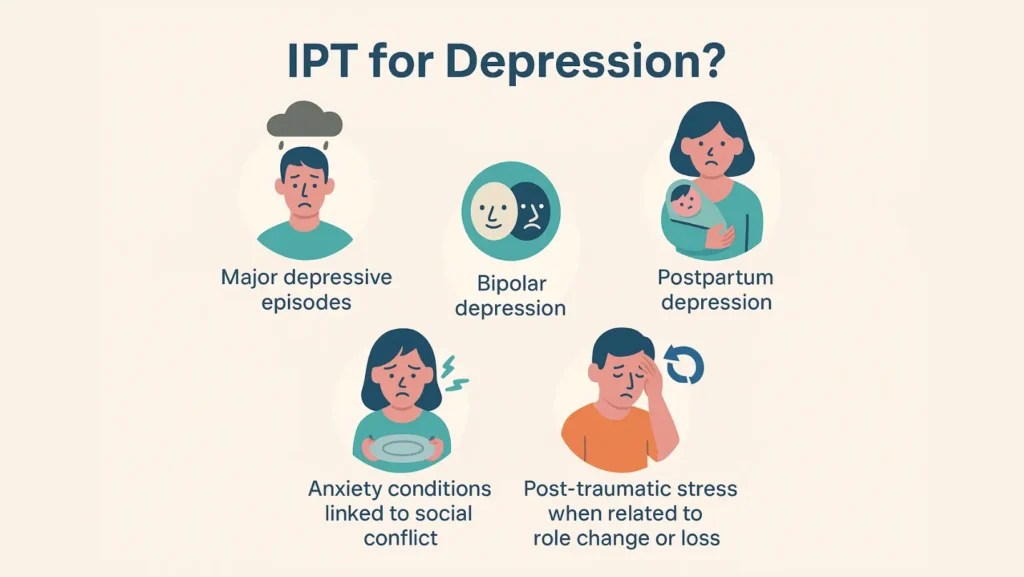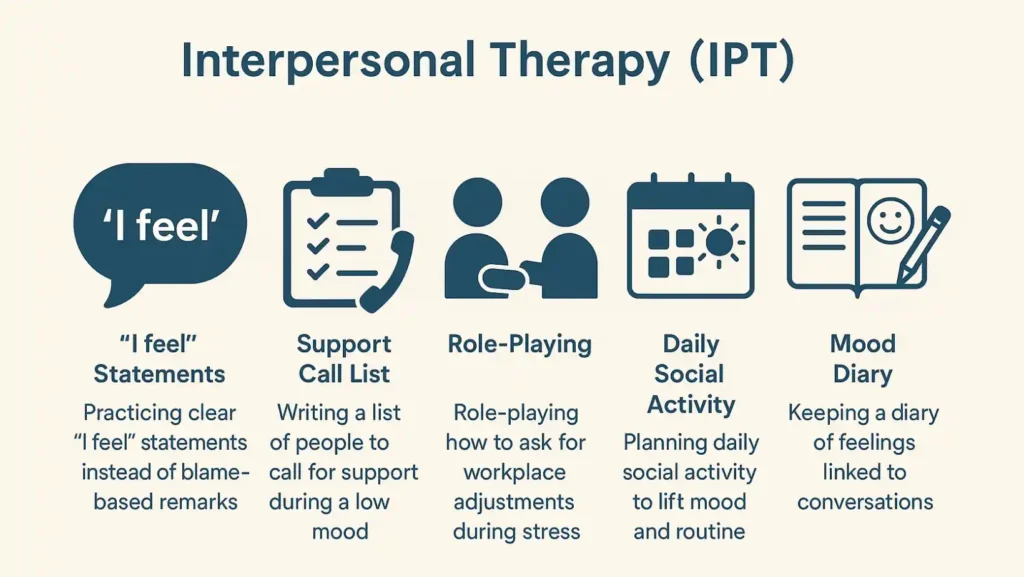IPT therapy is one of the most trusted forms of structured talk-based care in modern mental health. It is designed to connect mood problems with day-to-day life and relationships. Unlike many long and open-ended counseling models, IPT is short, focused, and practical.
IPT is a type of psychotherapy that helps people improve mood by improving relationships. In this detailed guide, you will learn what interpersonal psychotherapy is, how it works, the treatment methods, and why many experts call it one of the best evidence-based mental health treatment options today
Overview of Interpersonal Psychotherapy (IPT)
What Is Interpersonal Psychotherapy (IPT)?
Interpersonal therapy (IPT) was developed in the 1970s as a short-term program to treat major depression. The central belief of IPT psychology is that mental health is deeply tied to human connection. Mood struggles often arise from unresolved conflicts, life role changes, or a lack of close support
Instead of digging into childhood memories, the therapy pays attention to present issues. A trained therapist works with the client to see how current relationships affect their emotional state. Then they create direct plans to make interactions healthier and more supportive. This process has been shown to reduce distress, improve communication skills development, and increase social confidence
What Can IPT Treat, Including Depression?

While the earliest research on IPT was focused on IPT depression, the therapy has expanded far beyond it. Today, experts use IPT to treat:
- Major depressive episodes
- Postpartum depression
- Bipolar depression (in some structured plans)
- Eating disorders such as bulimia
- Anxiety conditions linked to social conflict
- Post-traumatic stress when related to role change or loss
Clinicians often recommend interpersonal therapy IPT for depression because it reduces relapse risk and improves daily function. IPT is also useful for teenagers, older adults, and people dealing with medical illness that impacts their mood
How Interpersonal Therapy (IPT) Works
The treatment works in structured phases. In the first sessions, the therapist explores the person’s symptoms, daily patterns, and most important ties. They then identify a problem area. The therapist may focus on grief, role changes, disputes, or gaps in social skills
Once an area is chosen, both client and therapist develop an action plan. This may include role-playing conversations, tracking emotional responses, or practicing new ways to ask for help. IPT uses clear, practical therapeutic techniques that give people tools they can apply right away
IPT Treatment And Techniques
Common IPT Therapy Approaches For Depression
In the case of IPT depression, treatment focuses on four classic problem areas:
| Problem Area | Example | Goal of IPT Work |
| Grief | Loss of a loved one | Process emotions and re-build supportive ties |
| Role Dispute | Conflict with a spouse or colleague | Learn direct speaking and problem-solving |
| Role Transition | Retirement, divorce, moving | Adjust identity and find new social roles |
| Interpersonal Deficit | Few close ties or isolation | Practice relationship-focused therapy steps to grow new bonds |
The therapist guides clients to see how each problem links to mood. They teach small, steady actions that restore balance. This way, IPT creates social functioning improvement in daily life
Interpersonal Therapy (IPT) Exercises And Strategies
The strategies are always hands-on. Some examples include:
- Practicing clear “I feel” statements instead of blame-based remarks
- Writing a list of people to call for support during a low mood
- Role-playing how to ask for workplace adjustments during stress
- Planning daily social activity to lift mood and routine
- Keeping a diary of feelings linked to conversations
These methods build both emotional regulation and social confidence. By training in sessions, clients are more prepared to handle real-life challenges without feeling overwhelmed
Risks, Benefits, And Considerations
Pros And Cons Of Interpersonal Psychotherapy
The benefits of IPT therapy include quick results, strong evidence for reducing depressive symptoms, and practical skills that last long after sessions end. IPT is short, often completed in 12 to 16 weeks, which is appealing to many clients. It can also be combined with medication when needed
However, not every case fits IPT. People with very complex trauma or those needing long-term behavioral therapy may need additional support. Some may also feel uncomfortable when painful conflicts or losses are brought up in therapy. The guidance of skilled professionals reduces these risks
When IPT Therapy May Be Recommended
Doctors often suggest ipt treatment when a person struggles with depression linked to life events or social stress. IPT is particularly effective when:
- A recent loss has triggered prolonged sadness
- Conflict in a marriage or job causes ongoing distress
- A major role change, such as parenthood or retirement, affects mood
- Isolation or lack of friendships worsens depressive symptoms
It may also be used for adolescents adjusting to school changes or for elderly individuals facing loneliness
Recovery And Outlook
How Long IPT Treatment Typically Lasts
Most standard IPT programs last 12 to 16 sessions, with one weekly appointment. Some people may need booster sessions to prevent relapse. Because the therapy is structured, progress is often seen within weeks. Unlike many longer models of mental health therapy, IPT is designed to create visible changes within a set time frame
Maintaining Long-Term Benefits From IPT
The best way to keep results is to keep using learned skills. For example, practicing open talk with friends, seeking early help when stress builds, and staying engaged in social life. Some people also return for brief check-in sessions once or twice a year. Combining IPT skills with lifestyle habits, such as exercise and sleep care, makes long-term gains stronger
The Bottom Line
IPT is one of the most trusted forms of short-term therapy. It links mood with daily ties, teaches direct skills, and reduces relapse. Interpersonal psychotherapy is a focused, structured talk therapy that treats mood by improving connections. It works across age groups and cultures and can be life-changing when practiced fully
If mood problems are linked to stress in your interpersonal world, IPT might be the right choice. Ask your therapist or doctor if this model fits your needs
FAQs
What are the benefits of interpersonal therapy?
It reduces depression, improves communication, and builds stronger social ties. IPT helps people recover faster and stay well by using skills in real life
What are the benefits of IPT?
IPT reduces relapse, helps manage stress, and offers structured care. The short program teaches lasting skills for mood regulation and relationship improvement
What are the 4 problem areas of IPT?
The four areas are grief, role disputes, role transitions, and interpersonal deficits. Each area focuses on the link between mood and social ties
What are the steps of IPT?
Steps include assessment, choosing a problem area, creating goals, practicing skills, and monitoring mood. Booster sessions may follow for long-term gains
What are the benefits of interpersonal wellness?
It improves health, reduces stress, and lowers the risk of long illness. Strong social ties also promote better sleep, mood, and emotional stability
What are the targets of IPT?
IPT targets symptoms of depression, daily role function, and interpersonal effectiveness. The aim is to improve mood and overall social health
Why are interpersonal skills important in therapy?
They help people express feelings clearly, reduce conflict, and build support. Good skills also prevent isolation and strengthen personal and family ties


















Leave a Comment